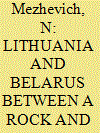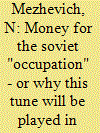|
|
|
Sort Order |
|
|
|
Items / Page
|
|
|
|
|
|
|
| Srl | Item |
| 1 |
ID:
189793


|
|
|
|
|
| Summary/Abstract |
THE marking of a full 30 years of the post-Soviet space, which coincided with a severe global economic crisis and the Special Military Operation in Ukraine, are reason enough to revisit the question of what has happened along Russia's Western borders. Since the early 1990s, the Russian expert community has adopted the Western paradigm of assessing transformation processes as a single model that can be applied at the very least from Tallinn to Chisinau, and at most from Vilnius to Dushanbe. It did not immediately become clear that in analyzing macroeconomic indicators, Western experts "tend to think globally or in regional terms, while studies of national specifics are few and far between, but this is precisely where the devil is."
|
|
|
|
|
|
|
|
|
|
|
|
|
|
|
|
| 2 |
ID:
180708


|
|
|
|
|
| Summary/Abstract |
IN 2015, a collection of articles was published in Latvia on two paramount issues - money and power.1 The articles are about money one wants to get from someone else in order to remain in power. It wasn't the first book of this kind, nor, of course, the last one. But it wasn't an ordinary book - it had been prepared for an important occasion. In December 2015, the justice ministers of Lithuania, Latvia and Estonia signed a declaration setting out a plan to calculate damages supposedly inflicted on the three countries by the USSR, demand that Russia pay them compensation, and make assessments of Soviet crimes from an international point of view.
|
|
|
|
|
|
|
|
|
|
|
|
|
|
|
|
| 3 |
ID:
175975


|
|
|
|
|
| Summary/Abstract |
THE EVENTS of summer 1940 in the Baltics remain the subject of largescale discussions at all levels - from classrooms to offices of heads of state. This is to be expected: "The basic trends of historical politics in the Baltic countries are the use by the political elites of administrative and legal instruments to consolidate the preferred 'versions of the past' as well as active political efforts at the interstate level to make the Baltic Versions of the past' part of the common European memory policies."1 I should say that these efforts were fairly successful. Late in the last century, Russia failed, for objective and subjective reasons, to present its interpretation of these historical events in their fullness. In the last decade, the situation changed
|
|
|
|
|
|
|
|
|
|
|
|
|
|
|
|
| 4 |
ID:
180732


|
|
|
|
|
| Summary/Abstract |
THE FUNDAMENTAL economic, political and medical challenges before us are universally recognized. Discussion is centered around a second question - namely: How are these challenges effecting global and European agendas? With respect to the East European security agenda, there has been practically no effect. In 2021, the United States and NATO will step up their military activity in Poland and what are known as the Baltic countries - Estonia, Latvia and Lithuania - and try to create as much trouble as possible for Russia and Belarus. Russia will be the hypothetical adversary in the planned Defender-Europe 21 command post exercise, as in preceding Defender-Europe exercises. This was common knowledge for a long time, but everybody avoided discussing it publicly. That has changed. For example, the Jamestown Foundation1 is no longer wondering whether attacking Russia and Belarus is advisable but is deliberating about what tactics to use in such an attack - for instance, what would be the quickest way to the "Smolensk Gate" [20].
|
|
|
|
|
|
|
|
|
|
|
|
|
|
|
|
| 5 |
ID:
189204


|
|
|
|
|
| Summary/Abstract |
IN THE 21st century, a certain confidence persisted for a long time that the specific nature of contemporary challenges in international relations was a deviation from the norm and was not destroying their essence. "Individual violations of the existing system, which states allow as an exception, should not necessarily be perceived as a movement toward the dismantling of the system of international law as such."1 However, today it is obvious that the interpretation of even the inviolable principles of international law depends on political expediency. Put more starkly, you could say that law has practically disappeared, giving way to transient rules of foreign policy expediency. Of course, in places where initially there were difficulties adapting to codified law - for example, in Eastern Europe - the understanding of neutrality and multi-vector policy turned out to be simplified and formalistic. Idealism in economic or political theory can be considered a possible approach that, under certain conditions, leads to the required academic results, but in foreign policy, it can yield negative and irreversible results.
|
|
|
|
|
|
|
|
|
|
|
|
|
|
|
|
| 6 |
ID:
191045


|
|
|
|
|
| Summary/Abstract |
VLADIMIR Yevgenyevich Churov passed away on March 22, 2023. The editorial board of International Affairs expresses its sincere condolences to the family and friends of Vladimir Yevgenyevich. We will remember him as an energetic politician who made a significant contribution to the creation and development of a new Russia, a researcher who opened new pages in the history of our great Motherland, a patriot who loved Russia selflessly We mourn him.
I FIRST met Vladimir Yevgenyevich in 1990. I was working at the Geographical Society of the Soviet Union as head of the lecture hall. Next door, Vladimir Yevgenyevich was working at the Mariinsky Palace as a deputy of the Leningrad City Council and came to us with a proposal to give a lecture on the ecology of the Eastern Baltic in the context of international cooperation. This may not surprise anyone today, but in 1990, it was something new. We got to know each other and discovered that we had dozens of common acquaintances and friends, though half of them were from Soviet Estonia. A long conversation then began and ended more than 30 years later. Despite our difference in age, we discovered that we had very similar civic and academic approaches. Only many years later did I learn from archival documents and told Vladimir Yevgenyevich that his father was a flagship navigator of the group of ships that landed on the Finnish island of Lunkulansaari in July 1941. My grandfather participated in that same landing as a captain lieutenant...
|
|
|
|
|
|
|
|
|
|
|
|
|
|
|
|
|
|
|
|
|